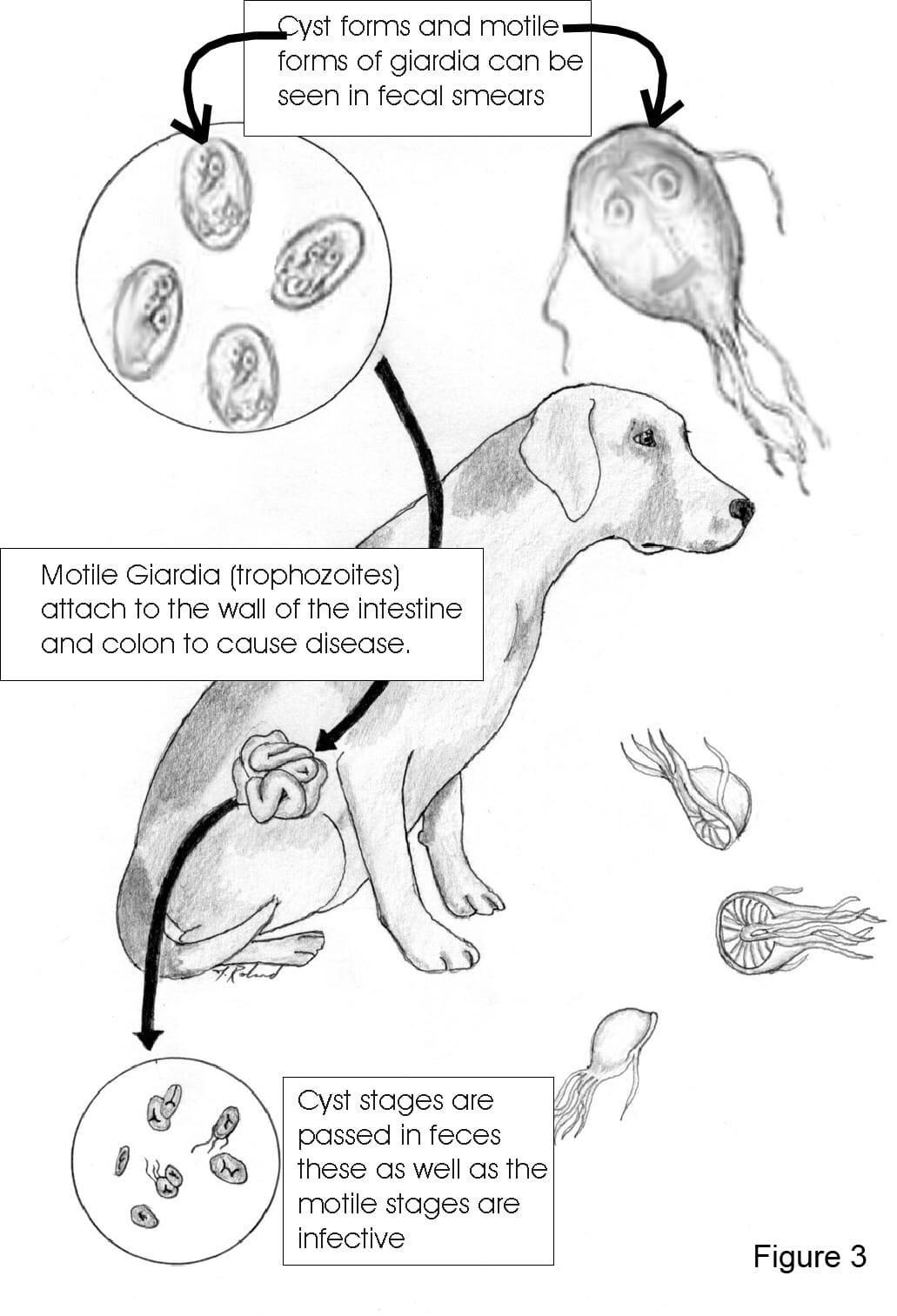Giardiasis is a common parasitic infection that can lead to diarrhea in dogs. This condition is caused by an intestinal parasite known as Giardia, which is often found in soil, food, or water contaminated with feces. While some dogs may not exhibit any symptoms, younger dogs or those with weakened immune systems are more susceptible to developing signs of infection. Preventing reinfection is crucial for successful treatment, which involves a combination of antiparasitic medications, environmental cleaning, and management both indoors and outdoors. If you’re concerned about your puppy’s health, understanding how dogs get Giardia is the first step.
Causes of Giardiasis in Dogs
Dogs contract Giardia by ingesting contaminated materials such as water, soil, food, or objects. The parasite exists in two forms: trophozoites, which reside in the intestines of infected dogs, and cysts. Cysts are trophozoites protected by a tough outer shell that are shed in the dog’s stool. These cysts are highly resilient and can survive in the environment for months, becoming infectious immediately upon ingestion. Even a small number of ingested cysts can lead to an infection. Dogs can easily reinfect themselves, for instance, by grooming areas like their fur, paw pads, or hind end where cysts may still be present.
Clinical Signs of Giardiasis
Many dogs infected with Giardia remain asymptomatic, maintaining a normal appetite and energy levels. However, in more severe instances, symptoms such as lethargy, decreased appetite, or weight loss may manifest.
The most frequent clinical signs associated with Giardiasis include:
- Sudden or acute diarrhea: This is often the most noticeable symptom.
- Soft or watery stool: The stool may contain mucus and possess a foul odor.
- Abdominal discomfort: Dogs might show signs of pain or unease in their stomach area.
Diagnosing Giardiasis
To diagnose giardiasis, your veterinarian will need to analyze a stool sample from your dog. Due to the intermittent shedding of Giardia cysts in feces, they might not always be detected in a single sample. Your veterinarian may recommend a second fecal test to identify other indicators, such as Giardia-specific antigens, which are small proteins produced by the parasite. This approach helps overcome the challenge of intermittent cyst shedding.
Treatment Strategies for Giardiasis
The primary goals of treatment are to resolve the diarrhea and alleviate other clinical signs. Dogs that are asymptomatic may not require any treatment.
Medication
- Fenbendazole: This is a commonly used deworming medication effective against Giardia.
- Metronidazole: An antibiotic that can also be prescribed for treatment.
- Combination Therapy: Your veterinarian might decide to use both fenbendazole and metronidazole in conjunction.
Diet
Your veterinarian may recommend a specific diet designed to support digestive health, which can aid in resolving diarrhea.
Bathing
It is essential to give your dog a thorough bath on the final day of treatment. This helps remove any remaining fecal material and Giardia cysts from their fur, minimizing the risk of reinfection.
Environmental Cleaning
- Disinfection: Common household disinfectants and steam-cleaning are highly effective in killing Giardia cysts.
- Feces Removal: Promptly remove and dispose of all feces.
- Sunlight: Giardia cysts on lawns can be inactivated by direct sunlight and drying.
Prognosis and Potential Complications
With appropriate treatment, the majority of dogs make a full recovery from giardiasis. If diarrhea persists after treatment, your veterinarian may need to re-examine a stool sample to rule out reinfection. Retesting for antigens is generally not recommended after treatment, as Giardia antigens can remain detectable even after a successful infection, potentially leading to false-positive results.
Dogs can become reinfected if their environment is not adequately managed. Furthermore, refractory infections can occur if the Giardia strain is resistant to the medication or if the medication was not administered correctly. It is also important to be aware that humans and other animals can contract Giardia, though the strains that typically infect humans differ from those affecting dogs and cats. Therefore, transmission from pets to humans is rare, but thorough handwashing after handling pets or infected feces is always recommended.
Contagion Among Pets
If you have multiple pets in your household, an infected dog generally does not pose a significant risk to a healthy cat, as they are susceptible to different strains of Giardia. Similarly, an infected cat is unlikely to transmit the parasite to a healthy dog.
However, an infected dog can increase the risk of exposing other dogs in the household due to the presence of cysts. To mitigate this risk, consider having pets defecate in separate areas, wiping the infected dog’s hind end after defecation, and preventing them from grooming each other. Continue prompt feces disposal, bathe the infected dog at the end of treatment, and always wash your hands after interacting with your pets and handling their waste.

